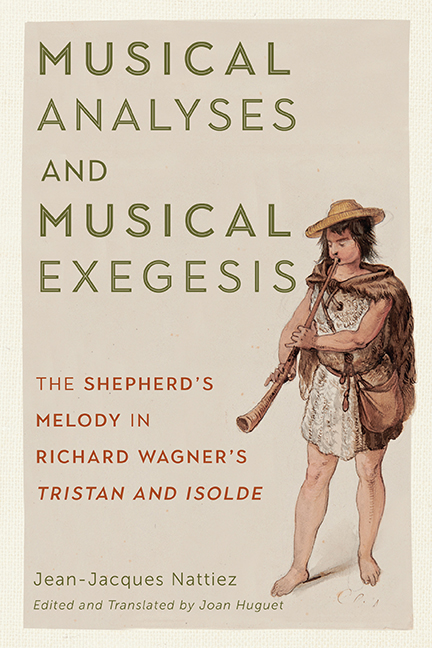 Musical Analyses and Musical Exegesis
Musical Analyses and Musical Exegesis Book contents
- Frontmatter
- Dedication
- Contents
- Foreword to the French Edition
- Preface
- Introduction: The English-Horn Solo, My Approach, and Models of Analysis and Musical Meaning
- Part I Immanent Analysis of the English-Horn Solo’s Musical Structures
- Part II Esthesic Analysis
- Part III Poietic Analysis
- Part IV Hermeneutics
- Conclusion: The Validity of Structural Analyses and Interpretations
- Bibliography
- Index
9 - The Shepherd’s Melody at Risk of Psychoanalysis
Published online by Cambridge University Press: 02 June 2021
- Frontmatter
- Dedication
- Contents
- Foreword to the French Edition
- Preface
- Introduction: The English-Horn Solo, My Approach, and Models of Analysis and Musical Meaning
- Part I Immanent Analysis of the English-Horn Solo’s Musical Structures
- Part II Esthesic Analysis
- Part III Poietic Analysis
- Part IV Hermeneutics
- Conclusion: The Validity of Structural Analyses and Interpretations
- Bibliography
- Index
Summary
A Return to Hermeneutics
Hermeneutic analysis has been present throughout the previous chapters of this study. In chapter 6, which discussed the solo's semantic associations, I attempted to distinguish between semantics and hermeneutics, a difficult task given that both treat networks of meanings. Hermeneutics differs from semantics in primarily being concerned with interpreting musical meanings by relating the musical material to various horizons.
In order to clarify and illustrate my modus operandi for part IV's hermeneutic approach, I will posit a distinction between two types of information:
In one category, we have the theory or philosophy through which a praxis or a work is interpreted. Psychoanalysis, Marxism, deconstructionism, feminism, genre study, and cultural studies are currently employed by all of the humanistic disciplines, including musicology. This chapter will apply Donald Woods Winnicott's reading of Freud's work to the various versions of the shepherd's melody in Tristan. In his study of the solo, which I will discuss at length below, Michel Imberty writes, “every interpretation is mediated by a metalanguage, whether historical, aesthetic, sociological, or psychoanalytic in nature.”
On the other hand, we have the horizons that serve as a starting point for interpretation. Interpretations can call upon many different horizons for context, often in combination, including the composer's biography, psychological state, and real-life experiences; the age's social milieu, culture, philosophy, religion, ideologies, and artistic and literary practices, all of which influence a work; and the different stylistic norms to which it might belong. For vocal music, we must also consider the context of the poem, the libretto, or the dramatic action. All of this must be considered from the perspective of the composer, listeners, and of course the musicologist, prioritizing the fusion of horizons as a foundation of understanding, to use Hans-Georg Gadamer's term.
It is thus unsurprising that, for some listeners, verbalizing semantic connotations serves as a launching pad for hermeneutic elaborations that draw on their real-life experiences. Annie Labussière's list of studies of the solo reveals that some commentators’ interpretations rely upon more detailed knowledge of Tristan. For them, the solo represents “the infinite nature of the sea and of death” (Camille Bellaigue, 1907); a musical reflection of Tristan's psychological state and the troubles that disturb his soul (Gabriele d’Annunzio,1901); “the slowness of waiting” and “the infinite sadness of dashed hopes” (Maurice Kufferath,1894); and the intermingling of “the networks of memory” in Tristan's own mind (François Grandsir, 1988).
- Type
- Chapter
- Information
- Musical Analyses and Musical ExegesisThe Shepherd's Melody in Richard Wagner's <I>Tristan and Isolde</I>, pp. 323 - 332Publisher: Boydell & BrewerPrint publication year: 2021


